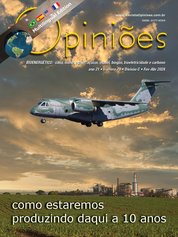Bruno Galvêas Laviola
Chefe-Adjunto de P&D da Embrapa Agroenergia
OpAA79
Biodiesel no Brasil: desafios e oportunidades
O biodiesel, um biocombustível derivado de fontes vegetais e animais, representa uma alternativa renovável ao diesel de petróleo, contribuindo para a diversificação da matriz energética brasileira. A implementação do Programa Nacional de Produção e Uso do Biodiesel (PNPB) marcou o início da adoção desse combustível no Brasil, estabelecendo diretrizes para uma produção sustentável, inclusiva e competitiva.
O programa incentivou a participação de pequenos produtores por meio do selo "biocombustível social" e definiu misturas obrigatórias de biodiesel no diesel, iniciando com 2% (B2) em 2005 e alcançando 14% (B14) atualmente. Há expectativas de aumento para 15% (B15) e, possivelmente, além de 20% nos próximos anos. No ano de 2023, o país obteve recorde de produção do biocombustível, produzindo cerca de 7,5 milhões de m³. Esse progresso reflete melhorias constantes na qualidade do biodiesel, alinhando-se às normas internacionais e garantindo a confiabilidade para os agentes econômicos.
O programa incentivou a participação de pequenos produtores por meio do selo "biocombustível social" e definiu misturas obrigatórias de biodiesel no diesel, iniciando com 2% (B2) em 2005 e alcançando 14% (B14) atualmente. Há expectativas de aumento para 15% (B15) e, possivelmente, além de 20% nos próximos anos. No ano de 2023, o país obteve recorde de produção do biocombustível, produzindo cerca de 7,5 milhões de m³. Esse progresso reflete melhorias constantes na qualidade do biodiesel, alinhando-se às normas internacionais e garantindo a confiabilidade para os agentes econômicos.
O Brasil se posiciona entre o terceiro e segundo maior produtor mundial de biodiesel, com a capacidade de ascender ao primeiro lugar devido ao seu robusto setor industrial e ao vasto potencial agrícola sustentável.
O país se beneficia de sua localização tropical, disponibilidade de terras cultiváveis e clima favorável, possibilitando a produção de alimentos e energia sem competição por recursos. A diversidade de espécies oleaginosas nativas e exóticas do Brasil, adequadas a diferentes condições climáticas e de solo, oferece amplas oportunidades para a exploração de matérias-primas alternativas ao óleo de soja, que atualmente domina o mercado de biodiesel, com cerca de 70% da produção.
A dependência do óleo de soja apresenta riscos estratégicos, levantando a necessidade de diversificar as fontes de matéria-prima para biodiesel. A diversificação da oferta de matérias-primas em escala é essencial para a expansão do setor, exigindo avanços tecnológicos para aumentar a viabilidade econômica e produtiva. Além disso, há de se considerar a demanda que virá por óleo vegetal e gorduras para a produção dos novos biocombustíveis, como os combustíveis sustentáveis de aviação (SAF) e o diesel renovável.
As perspectivas para o biodiesel nos próximos anos são amplamente positivas, refletindo a conjuntura global de transição energética para fontes mais sustentáveis e renováveis. Com base no contexto apresentado, podemos destacar os seguintes aspectos que moldarão o futuro do biodiesel:
Aumento da mistura obrigatória: Com a previsão de elevação da mistura de biodiesel no diesel para 15% (B15) e discussões para aumentar ainda mais essa porcentagem para além de 20%, espera-se um aumento significativo na demanda por biodiesel. Isso incentivará a expansão da capacidade produtiva e da inovação tecnológica no setor.
Desenvolvimento tecnológico e diversificação de matérias-primas: Sendo um país com grande potencial agrícola, o Brasil possui a oportunidade de desenvolver tecnologias para o cultivo e processamento de oleaginosas além da soja, como a palma-de-óleo, a canola, o algodão, o girassol, o cártamo, a macaúba, entre outras. Isso não apenas aumentará a oferta de matéria-prima para o biodiesel, mas também reduzirá a dependência de uma única fonte, promovendo a sustentabilidade e a resiliência da cadeia produtiva.
Integração com a agricultura sustentável: A produção de biodiesel no Brasil tem o potencial de ser integrada com práticas agrícolas sustentáveis, aproveitando a localização estratégica do país, seu clima e a disponibilidade de terras agricultáveis sem comprometer os grandes biomas nacionais. Isso pode incluir o cultivo de oleaginosas em sistemas de produção que favoreçam a biodiversidade e o uso eficiente dos recursos naturais. Por exemplo, a rotação de culturas pode ser utilizada para alternar entre cultivos alimentares e oleaginosas destinadas à produção de biocombustíveis, enriquecendo o solo e aumentando sua produtividade.
A integração de cultivos com a pecuária em sistemas de iLPF (Integração Lavoura-Pecuária-Floresta) não só otimiza o uso da terra, mas também contribui para a recuperação de pastagens degradadas.
Políticas Públicas e Incentivos: Para o Brasil atingir seu potencial máximo como produtor de biodiesel, políticas públicas e incentivos serão cruciais. Isso inclui o apoio à pesquisa e ao desenvolvimento de novas tecnologias, à criação de mecanismos de financiamento para produtores e indústrias, e às políticas que promovam a inclusão social e o desenvolvimento regional.
Mercado global e exportação: Com a crescente demanda global por energias renováveis, o Brasil está bem posicionado para se tornar um líder mundial na produção e exportação de biodiesel. Isso exigirá investimentos em logística e capacidade produtiva, bem como esforços para garantir a qualidade e a sustentabilidade do biodiesel brasileiro nos mercados internacionais.
Desafios técnico-científicos e políticos: O desenvolvimento do setor de biodiesel no Brasil continuará a enfrentar desafios, incluindo a necessidade de superar gargalos técnico-científicos, como melhorias no rendimento e na eficiência de processos produtivos e desafios políticos, como a estabilidade de políticas de incentivo e a harmonização de interesses entre os diferentes stakeholders.
Conscientização e aceitação social: A aceitação e a demanda social por biodiesel, como uma alternativa sustentável ao diesel de petróleo, são fundamentais para o seu sucesso. Iniciativas de educação e conscientização podem desempenhar um papel crucial na promoção do biodiesel e na construção de um mercado robusto.
Em resumo, o futuro do biodiesel no Brasil é promissor, com potencial para liderança global, diversificação econômica e contribuição significativa para a sustentabilidade ambiental. Contudo, para que essas perspectivas se concretizem, será necessária uma abordagem coordenada que envolva inovação, investimento e colaboração entre os setores público e privado, além do compromisso contínuo com a sustentabilidade e a inclusão social. Para o Brasil, sem dúvida alguma, o biodiesel é um bicombustível que
veio para ficar.




